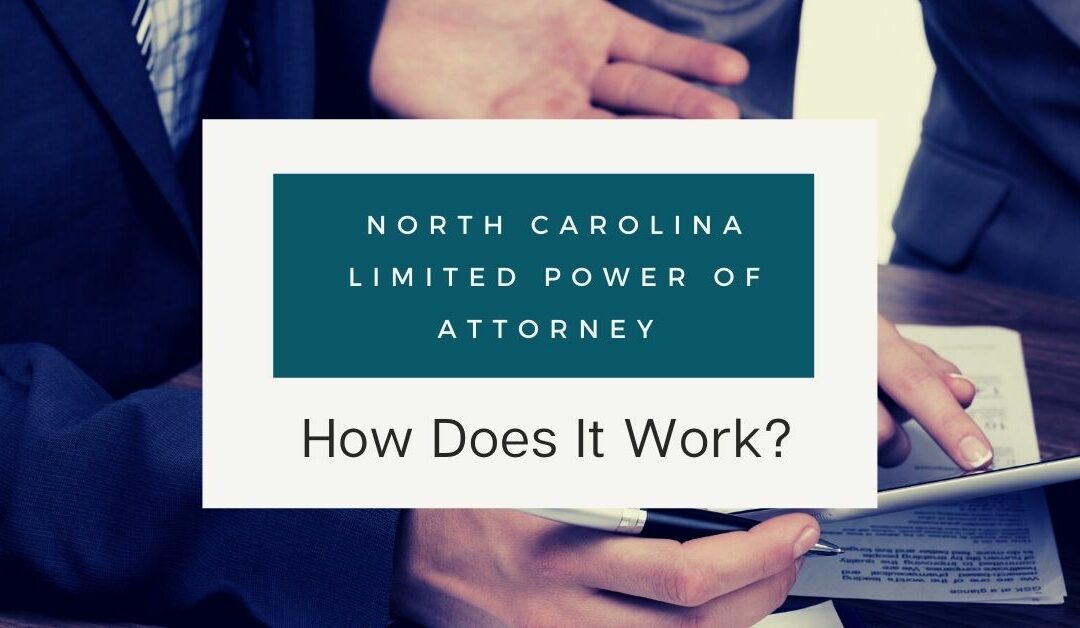If you need to appoint an attorney-in-fact to handle a specific task or transaction on your behalf, you can use a limited power of attorney. This document allows you to designate someone else to take care of your business without giving them full authority over your affairs. Let’s look at what a limited power of attorney does for you in North Carolina.
Limited Power of Attorney in North Carolina: What Is It?
A limited power of attorney is a legal document that gives someone else the authority to act on your behalf in a specific situation. Your POA could be for a one-time task or an ongoing transaction.
The person you appoint to act on your behalf is called your “attorney-in-fact.” As the “principal,” you retain all legal rights and authority unless you specifically give the attorney-in-fact power to act on your behalf.
What Requirements Make a Limited Power of Attorney Valid?
There are specific requirements that the documents must meet for a limited POA to be valid in North Carolina. The document must be in writing, and the principal (you) must sign. The limited power of attorney must also state the specific powers granted to the attorney-in-fact.
Creating a limited POA online means you are getting a generic contract. Working with form creators online often leads to a contract missing important parts of your specialized agreement. If you need to create a limited power of attorney in North Carolina, contact an estate planning attorney to help you properly delegate limited (special) powers to your agent.
Why Use a Limited Power of Attorney in North Carolina?
If you need someone to handle a specific task or transaction on your behalf, but you don’t want to give them full authority over all of your affairs, you would use a limited POA.
For example, if you are buying a house and the closing is taking place while you are out of state, you could give limited power of attorney to your real estate agent so that they can sign the necessary documents on your behalf.
Another common reason people use limited POA is when they become incapacitated and can no longer make decisions. In this case, you would use the limited power of attorney to delegate financial decision-making authority to another person.
If you have questions about the different types of POA, talk to your estate planning attorney about your options. A commonly used POA is called a general POA. It is broader, and your agent can act in almost any way. However, even a general POA has limits.
Limits of a General Power Of Attorney
A General POA has limits also. Some of the limitations placed on this relationship include:
- Act With Integrity: As a POA, your agent is your fiduciary. You place your trust or confidence in your agent. When your agent acts as your POA, they are bound to exercise the utmost good faith, loyalty, and honesty toward you.
- Not a Contract for Services: Your POA document is not a hiring contract. You generally can’t write a POA document with binding obligations for services to you included.
- Generally can’t vote for you.
- Can’t get married or divorced for you: Generally, both parties need to be present for a marriage to take place. (2) In North Carolina, “only a competent spouse may commence an action for absolute divorce.”
- Write your will for you (See N.C. Gen. Stat. § 31-11.6)
- Limited power to fund your trust. The power of an agent acting under a power of attorney to deal with a trust. NC Law explains in Section 36C-6-602.1 of the Uniform Trust Code.
Talking with your attorney if you have mitigating circumstances can help you see when these limitations may not apply in your particular situation.
Invalidating a POA
Certain events can invalidate a POA. A power of attorney is no good anymore if these events happen:
- Your death (unless its a POA coupled with an interest)
- Your incapacity (unless your POA is a Durable POA under NCGS 32A)
You may revoke the POA orally at any time, so if your power of attorney arrangement is not working for you, you can end it quickly.
We Can Help
If you need someone to act as your attorney-in-fact in specific or more general ways, contact us at Hopler, Wilms, and Hanna. We can help you create a limited or a general power of attorney that will work for your unique circumstances.
Our experienced estate planning lawyers can help you understand the pros and cons of each type of POA and decide which one is best for your particular situation. Give us a call today to schedule a consultation. Find out how we can help.

